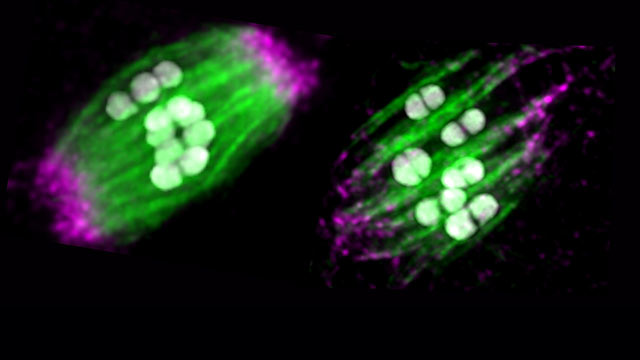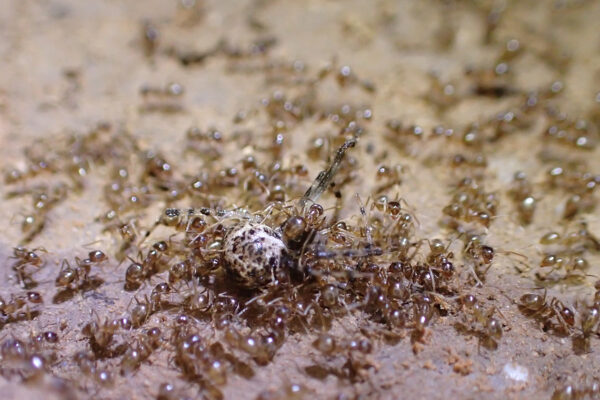細胞分裂を正常に保つ隠れたメカニズムを世界で初めて解明 Study is first to uncover hidden mechanism that keeps cell division on track
2022-03-29 ノースウェスタン大学
ノースウェスタン大学の研究者らは、回虫の卵細胞を分裂エラーから守る、これまで知られていなかった機構を発見した。この隠されたメカニズムを解明し、理解することは、最終的にヒトの不妊症に対する新しい戦略につながる可能性があります。
<関連情報>
- https://news.northwestern.edu/stories/2022/03/roundworms-egg-cells-have-a-backup-plan/
- https://elifesciences.org/articles/72872
線虫卵子減数分裂における先体紡錘体双極性の確立と維持に向けた複数のモーターの連携 Multiple motors cooperate to establish and maintain acentrosomal spindle bipolarity in C. elegans oocyte meiosis
Gabriel Cavin-Meza,Michelle M Kwan,Sarah M Wignall
journal eLife Research Article Feb 11, 2022

A normal spindle in an egg cell (left) compared to a spindle after the removal of the motor protein dynein (right). Microtubules are shown in green; chromosomes are in white; and spindle poles are labeled in magenta.
Abstract
While centrosomes organize spindle poles during mitosis, oocyte meiosis can occur in their absence. Spindles in human oocytes frequently fail to maintain bipolarity and consequently undergo chromosome segregation errors, making it important to understand the mechanisms that promote acentrosomal spindle stability. To this end, we have optimized the auxin-inducible degron system in Caenorhabditis elegans to remove the factors from pre-formed oocyte spindles within minutes and assess the effects on spindle structure. This approach revealed that dynein is required to maintain the integrity of acentrosomal poles; removal of dynein from bipolar spindles caused pole splaying, and when coupled with a monopolar spindle induced by depletion of the kinesin-12 motor KLP-18, dynein depletion led to a complete dissolution of the monopole. Surprisingly, we went on to discover that following monopole disruption, individual chromosomes were able to reorganize local microtubules and re-establish a miniature bipolar spindle that mediated chromosome segregation. This revealed the existence of redundant microtubule sorting forces that are undetectable when KLP-18 and dynein are active. We found that the kinesin-5 family motor BMK-1 provides this force, uncovering the first evidence that kinesin-5 contributes to C. elegans meiotic spindle organization. Altogether, our studies have revealed how multiple motors are working synchronously to establish and maintain bipolarity in the absence of centrosomes.


